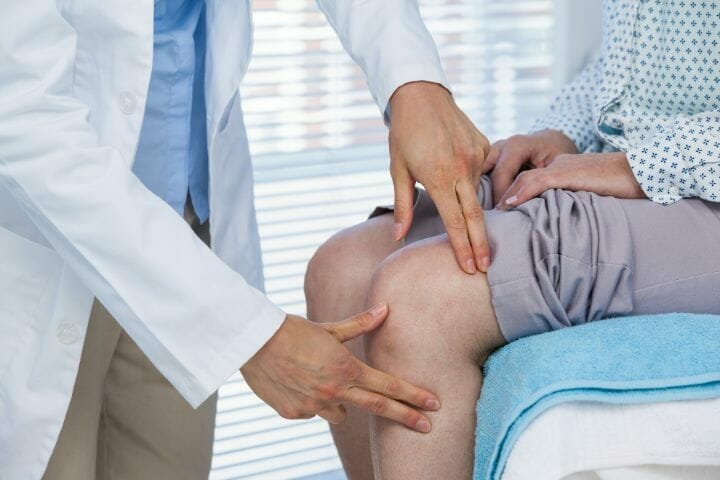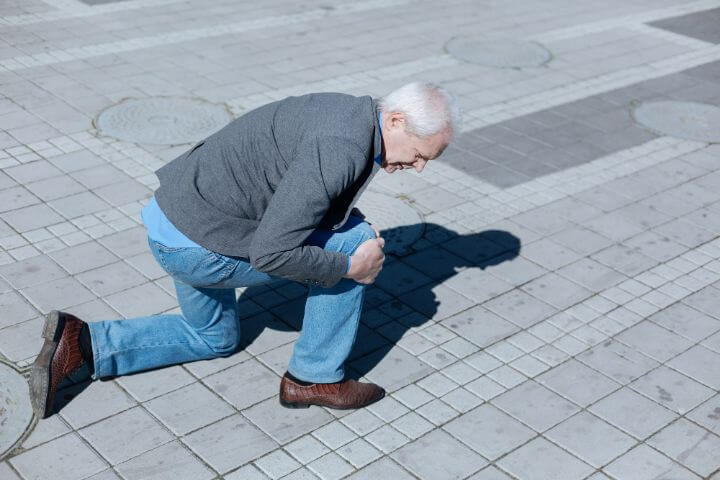The simple answer to this is yes. If you have had knee replacement surgery, you may damage your new knee implant if you fall on it. This could be due to balance or other issues.
Contents
As per a study conducted, patients are more prone to falls after knee replacement than healthy people. (Incidence and Risk Factors for Falling in Patients after Total Knee Arthroplasty Compared to Healthy Elderly Individuals. https://www.ncbi.nlm.nih.gov/pmc/articles/PMC4404524).
At present, the implants used for knee transplants are strong. Materials such as cobalt-chromium alloys or titanium with polyethylene make up these implants. They are unlikely to be damaged after a fall once your knee has completely healed.
But, in the initial few weeks after surgery, you will have to exercise caution. During this time, you might harm them if you land on your knees when you fall. Since all kinds of falls can lead to some amount of damage, it is a good idea to remain cautious at all times.
This article will inform you about the damage a fall can do to your implant. We also discuss how to assess the extent of damage, how to manage it, and finally, how to prevent accidental falls altogether.
Also read Best Chair to Use After Knee Replacement
Risk Factors for a Fall
A study was conducted to understand the reasons for falls. It involved 134 knee replacement patients. 23 of these patients had a fall at least once during their six-month follow-up period.
(Falls After Total Knee Arthroplasty: Frequency, Circumstances, and Associated Factors—A Prospective Cohort Study https://academic.oup.com/ptj/article/98/9/767/5040252)
It was observed that out of 31 falls recorded, 67.7% were while walking. The most common reasons were tripping and slipping, 35.5% each.
Place-wise, most falls happened at home (45.2%) or other indoor places (29%). Most of these patients were not using any walking aids, such as canes, at the time of the fall (87.1%).
Damage-wise, 4 of these falls led to minor bruising injuries (12.9%). No bone fractures were recorded in the observed cases.
You might also like our article on age for Medicare coverage for knee replacement
Fall During Initial Weeks After Surgery
Your knee will still be healing in the initial weeks after surgery.
If you fall during this time, i.e. approximately within the initial eight weeks of your knee replacement, you may damage your knee implant. It may even loosen or dislocate. Depending on the damage, you might need to go in for revision surgery.
In the event of a fall, visit your orthopedic surgeon immediately to assess any damage to the knee.
Fall After Healing of the Knee
If you fall long after the healing is complete, it is unlikely that there will be any damage to the knee. You may get some soft tissue damage, but the chances of your strong titanium or cobalt-chromium implant getting damaged are low.
Symptoms of Damage to the Knee Implant After a Fall
In such cases where some harm to the knee implant is suspected, you may notice any or all of the following symptoms:
- A lot of bleeding from the surgical area
- Rupture(opening) of the stitches
- Pain and swelling in the area
- Difficulty walking
- Decreased range of motion in the knee
- Painful popping in the knee
- Any other new signs and symptoms not initially present
In all the above conditions, visit your orthopedic surgeon immediately.
You might also like Can You Kneel Down After a Knee Replacement?
Injury Management After a Fall
A study was done to evaluate the damage to a knee implant after falling. It recorded that eight patients out of a total of 78 had soft-tissue injuries (10.3%) that ultimately had poor outcomes.
These outcomes were deep infections, resection arthroplasty (removal of part of the knee to reduce symptoms), or knee arthrodesis (fusing thigh and shin bones manually to stabilize and heal them to relieve symptoms such as pain). (Management of falls after total knee arthroplasty. https://pubmed.ncbi.nlm.nih.gov/19292249)
The remaining 89.7% of the cases had favorable outcomes after the damage was managed either through surgery or conservatively (without surgery).
So, if you get wounded on falling after a knee replacement, it is considered an emergency. Such a wound is irrigated and debrided (thoroughly cleaned for all debris and foreign material) first of all. After that, the treatment protocol defined for such injuries, is followed. X-rays and other imaging may also be required to diagnose the extent of damage to the implant or knee.
Consequently, depending on the damage, your surgeon will advise whether you need a revision surgery (re-surgery) or whether it can be managed conservatively.
How Can You Prevent a Fall After Knee Replacement?
By exercising a little caution, most of the falls can be avoided. Just keep the following tips in mind.
- Take small, steady steps while walking.
- Wear shoes with non-skid soles. Avoid heels and loose shoes.
- Take the support of canes, crutches, etc. in the initial weeks after surgery.
- Avoid walking on sloping, wet, icy, or slippery surfaces.
- Keep the house free of loose cords and wires. Remove rugs that can trip you.
- Make use of supports such as handrails and grab bars wherever possible.
- Use rubber mats and grab bars when showering.
- Maintain the shower less slippery
- Do strength-building exercises daily like using resistance bands to build muscle strength.
You might also like Best Age for Knee Replacement Surgery
Takeaway
Falls are the most common accidents that can occur, especially in the elderly population. With reduced stability after a knee replacement surgery, the chances of falling are even more.
Knee implants are sturdy prosthetics that do not break easily or get damaged when you fall. However, there can be some damage when you fall in the initial weeks of healing. It is best to exercise caution once you have a knee replacement, as any fall can lead to some amount of damage.
Assess all your risk factors, take necessary preventive steps and remember to fall back on your specialist in case of any big or small falling accident.
If you are unable to work after having a knee replacement surgery, you can claim a benefit from Social Security. To read more – Does Knee Replacement Qualify For Disability?
Here are some articles we covered that may help you along with your recovery.
- How Long to Wear Compression Stockings After Knee Replacement Surgery?
- Bike Riding After Knee Replacement – Tips and Precautions
- Skiing After Knee Replacement – Precautions and Tips
- Hiking After Knee Replacement – Precautions and Tips
- Yoga After Knee Replacement – A Complete Guide!
- Driving After Knee Replacement – All You Need to Know
- Can You Run After Knee Replacement



